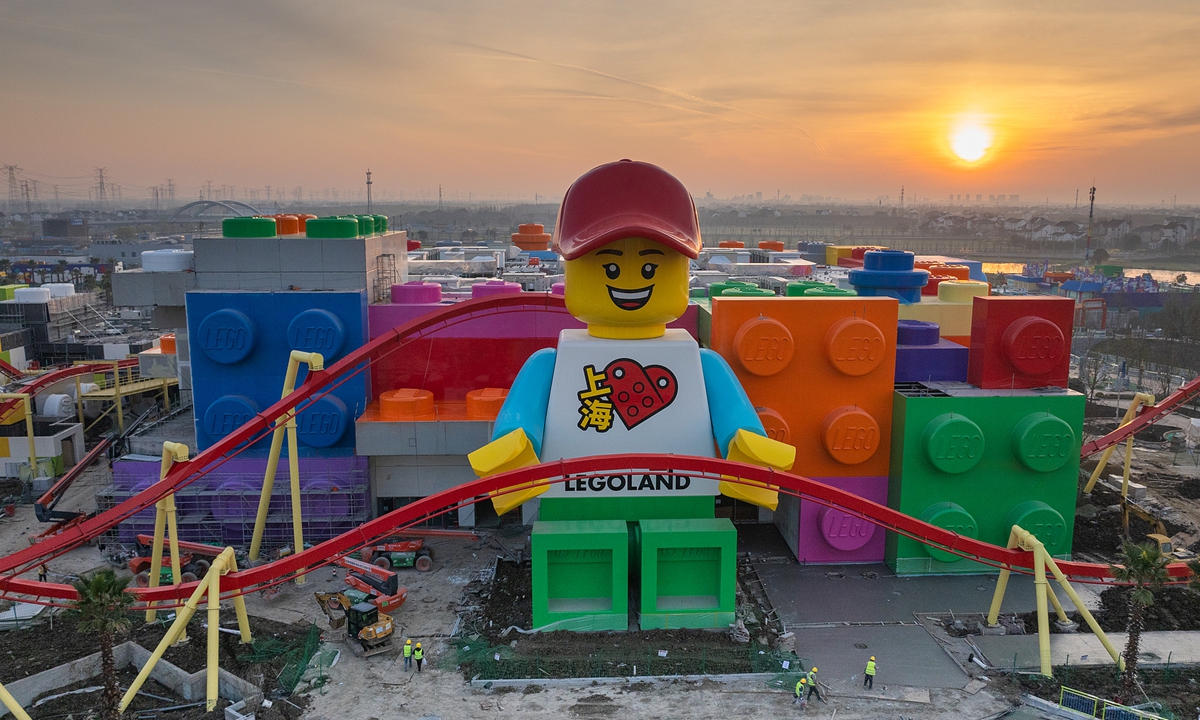
Legoland Shanghai Resort Photo:VCG
Legoland Shanghai Resort announced the single-day ticket policy on Wednesday as it prepares to open this
mksummer. The move marks another step in the expansion of foreign-invested amusement parks in China, as international firms tap into the country's growing "joy economy" and vast consumer market.
The resort will use a six-tier ticket system. The prices start from 255 yuan ($35.07) for children and 319 yuan for adults during off-peak season. The top prices are 479 yuan for children and 599 yuan for adults for busy periods during major holiday, according to its official website.
Legoland Shanghai Resort will be China's first Legoland, the 11th in the world, and will become the largest Legoland in Asia and the largest at its opening in the world.
Designed for children aged 2 to 12 and their families, it features more than 75 interactive rides, engaging shows, and attractions. Ride installation is currently 80 percent complete, with 12 out of 24 already in the commissioning phase, the Global Times learned from the resort.
The construction momentum comes as Shanghai sees theme park investment boom as global operators look to capitalize on China's expanding entertainment and consumption markets.
Warner Bros has partnered with Jin Jiang International Holdings Co., Ltd., Chinese travel and hospitality conglomerate, to build a Making of Harry Potter studio tour at Shanghai Jinjiang Action Park.
Scheduled to open in 2027 with a 2.8-billion-yuan investment, the Harry Potter attraction will be the first of its kind in China and the third in the world.
Adding to Shanghai's theme park boom, an outdoor Peppa Pig theme park is also in the pipeline, which aims to be an international family-friendly attraction with immersive cultural tourism.
The Chinese government has pledged to accelerate landmark investment projects and step up efforts to foster new forms of cultural business and vigorously develop the tourism industry, according to the 2025 Government Work Report, the Xinhua News Agency reported.
Zhang Yi, CEO of the iiMedia Research Institute, told the Global Times on Wednesday that the confidence of international parks in China stems from its huge and steadily growing consumer market. As China's per capita GDP continues to grow, consumers' demand for cultural and entertainment activities has increased significantly. The huge market demand provides a solid foundation for investment, enabling foreign-funded enterprises to see the potential for investment returns.
On the other hand, China's continued opening-up efforts, with good policy stability, have provided a stable investment environment for foreign-funded enterprises, Zhang added.
China's efforts to attract foreign investment—especially in the services sector—have created a more convenient environment for global firms, Wang Peng, an associate research fellow at the Beijing Academy of Social Sciences, told the Global Times.
China is accelerating the development of new-type cultural businesses and the tourism industry, creating significant opportunities for foreign companies to invest in constructing entertainment facilities and providing related services, Wang added.
Under China's 2025 action plan to stabilize foreign investment, China will further open up cultural sectors among other areas. Foreign investment is welcomed in services sectors such as aged care, culture and tourism, sports, health care, vocational education, and finance.
Foreign direct investment (FDI) in the Chinese mainland in actual use reached 171.21 billion yuan in the first two months of 2025, according to the Ministry of Commerce. In the first two months 7,574 new foreign-invested enterprises were established nationwide, representing a year-on-year growth of 5.8 percent, it said.

